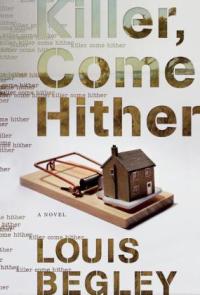The New Life of Hugo Gardner by Louis Begley
 Wednesday, March 18, 2020 at 8:11AM
Wednesday, March 18, 2020 at 8:11AM 
Published by Doubleday/Nan A. Talese on March 17, 2020
At 85, Hugo Gardner thinks of himself as a “tattered coat upon a stick.” He misses Valerie, to whom he was long married, but she recently left him for the younger man with whom she was sleeping. As an elderly husband he was boring, despite having once had an exciting career as a foreign correspondent and eventually as the editor of Time. While his daughter depends on him to pay tuition for his grandchildren, she otherwise sides with her mother and makes clear that she despises him. He gets along with his son, but has a vague feeling that he failed both of his children as well as his wife and grandchildren. His contacts with his son and grandkids have been “pleasant but not particularly affectionate.”
When Hugo must decide whether to have treatment to prevent his prostate cancer from metastasizing, he considers whether he wants to prolong his life and at what cost. Despite his shortcomings and the malaise they have produced, he thinks he is happy, albeit lonely. He takes joy from his garden and the birds it attracts, from walks on the beach and his writing projects, from food and drink and books and operas. If his memories are not all good, some are splendid. Hugo feels vast regret that he will die, a fate that comes closer every day, but he wants to die on his own terms: lucid, mobile, and independent.
As Hugo ponders his choices, he has occasion to go to France, where he worked for years as a journalist. He looks up some old friends, chats with them about the unlikely presidential candidate running against Hilary. He eventually contacts a former lover he abandoned for Valerie. They rehash old memories, not always pleasant (particularly from Jeanne’s perspective), but they make new ones, at least until the time comes to think about the future.
Unlike novels about seniors who look back at their lives, The New Life of Hugo Gardner is primarily about the difficulty of looking forward when not much time remains. Thinking about the future isn’t easy when there isn’t much future left. Hugo considers the future that everyone faces to be bleak, given the world’s refusal to confront the reality of global warming and its growing embrace of totalitarian leaders, but his concerns are more personal. Forming new or renewed relationships is difficult after a certain age. It is unlikely, after all, that he will find someone who will commit to a relationship that is doomed to end in the relatively near future. Even adopting a dog, only to make it an orphan, seems like a bad idea.
Or is Hugo refusing to think outside the box? He is hardly alone in his loneliness. Even much younger people feel isolated. Perhaps if he opens himself to opportunity, the rest of his days can be shared with people who care about him, even if those relationships are not what he had with Valerie or Jeanne.
The New Life of Hugo Gardner is not a novel for readers who insist on a page-turning plot. It is a contemplative character study that meanders in the nonlinear direction of thoughts that occur to an aging man. The publisher calls this novel a “comedy of manners,” but I read it as a bittersweet exploration of the nuances of aging. Hugo is far from a typical octogenarian — he is surprisingly virile for a man of his age — but he embodies the regrets of men who have lived self-absorbed lives, men who gave attention to careers rather than families and friends, who feel both betrayed and guilty as they try to chart a path forward. Hugo’s self-analysis and refusal to blame others for his faults gives him a certain charm, and his insightful commentary on life as it nears its end gives surprising weight to a light novel.
RECOMMENDED
